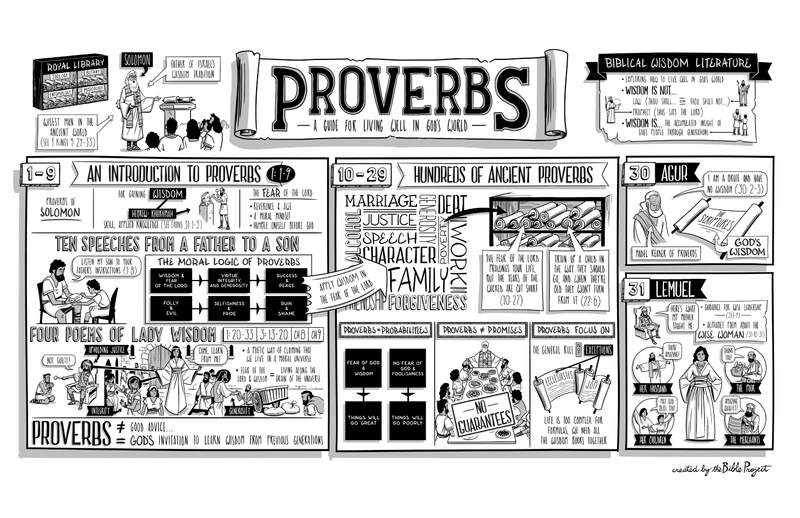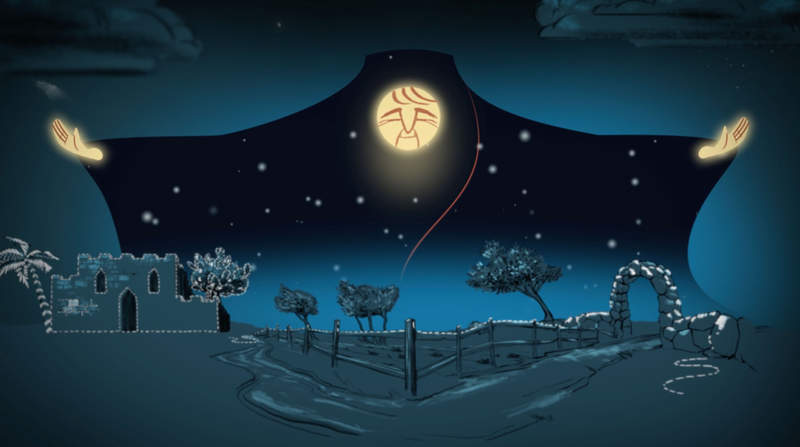The Book of Proverbs
About

The word “proverb” typically refers to a short, clever saying that offers wisdom in some way. While this book does contain many hundreds of proverbs, most of them are found in the center section of the book (chs. 10-29). In the outer frames of the book (chs. 1-9 and 30-31) are more elaborate poems all about wisdom. There is more to this book than you might think.
Proverbs 1:1-9: Introducing Solomon’s Wisdom and the Fear of the Lord
The book of Proverbs has been designed with a short introduction in 1:1-9 that starts by linking the book to King Solomon, son of David. Remember the story in 1 Kings 3 in which Solomon asked God for wisdom to lead Israel well? God honored his request, and Solomon became known as the wisest man and teacher in the ancient world. In 1 Kings 4:29-33, we’re told that he wrote thousands of proverbs and poems and that he collected knowledge about plants and animals. Solomon became the fountainhead of Israel’s wisdom literature, a group of texts that explore what it looks like to live well in God’s good world. Not all the material in this book is written by him personally, but Israel’s wisdom tradition began with him.
The introduction goes on to say that by reading this book, you will gain wisdom. For most of us, this word simply means “knowledge,” but the Hebrew word chokhmah means more than just mental activity. It refers primarily to practical knowledge, and it would be better translated with the words “skill” or “applied knowledge.” This is why artists and craftsmen in Israel were said to have chokhmah, that is, skill (Exod. 31:3). The purpose of this book is to help you develop a set of practical skills for living well in God’s good world.
The introduction also links with another foundational idea in this book: “The fear of the Lord is the beginning of wisdom” (Prov. 1:7; Prov. 9:10). The word fear is not about terror. Rather, it refers to a sense of reverence and awe before God, which makes clear our small place in the universe. It’s a moral mindset that recognizes that we are not God and don’t get to make up what’s right and wrong for ourselves. The fear of the Lord is a posture of humility before God, embracing his definition of good and evil even when it’s difficult or inconvenient.
Proverbs 1-9: Poems From a Father and Lady Wisdom
This introduction leads us into the first main section of the book (chs. 1-9), which doesn’t contain any proverbs at all. Instead, we find 10 speeches from a father to a son. The father tells the son that he should listen to wisdom and cultivate the fear of the Lord. This will require a life of virtue, integrity, and generosity, all of which will lead to success and peace. The father warns the son about folly and evil, about shortsighted, selfish decisions and pride. All of these will lead to ruin and shame. Therefore, the son should make the pursuit of wisdom and the fear of the Lord his highest goals. This way of thinking forms the moral logic of the entire book.
These speeches clue us in to what biblical wisdom literature is and how it’s different from other parts of the Bible. While it does explore how to live well in God’s world, wisdom is neither law nor prophecy. Rather, wisdom is the accumulated insight of God’s people through the generations. It is all about how to live in a way that honors God and others. Through the book of Proverbs, these human words about wisdom have become God’s word and wisdom to his people.

This connects to another key theme in chapters 1-9, the words of Lady Wisdom. There are four poems where wisdom is personified as a woman, calling out to humanity to pay attention to her and to seek her out. Wisdom says that she is woven into the very fabric of the universe. Whenever people are making wise decisions, they’re relying on her. Whenever someone is being generous, having sexual integrity, or upholding justice, they’re drawing on wisdom. These Lady Wisdom poems are a creative, poetic way of exploring the idea that we live in a moral universe and that goodness and justice are objective realities that we ignore at our own peril. To fear the Lord and live wisely is to live along with the grain of the universe.
Together, these twin sets of speeches from the father and Lady Wisdom make a powerful claim about the book of Proverbs. This book doesn’t simply offer good advice. It is an invitation from God to learn human and divine wisdom from previous generations of God’s people.
Proverbs 10-29: The Collection of Ancient Sayings
In chapters 10-29, we finally come to the collections of proverbs. Here are hundreds of ancient sayings that apply wisdom and the fear of the Lord to every life topic you can imagine, including family, work, community life, friendship, sex, marriage, money, anger, forgiveness, alcohol, and debt. These proverbs are short and easy to memorize. This section of the book is meant to become like a reference work to which you return time after time for the rest of your life.
This raises an important issue in reading this book. Proverbs are, by nature, about probabilities. If a person fears the Lord and makes wise, moral choices, things will likely go well for them. If a person doesn’t fear the Lord and acts foolishly, their life will more likely turn out poorly. Both of these statements are often true, but not always. Therefore, the proverbs are not promises or guaranteed formulas for success.
For example:
“The fear of the Lord prolongs your life, but the years of the wicked are cut short.”
Or:
“Train up a child in the way they should go, and when they’re old, they won’t turn from it.”
Fearing God and being moral is more likely to lead to a better, longer life. Raising your kids in a stable, loving home can set them up well for the rest of their lives, but there’s no guarantee. Lots of things can and do go wrong in our world.
Proverbs, by their nature, focus on the general rule and not the numerous exceptions to that rule. The biblical wisdom books are not ignorant about this. In fact, these exceptions to the moral rule are what the books of Job and Ecclesiastes are all about. Life is too complex for formulas, which is why we need all these books of accumulated wisdom to get to the bigger picture.
Proverbs 30-31: The Wisdom of Agur and King Lemuel’s Mother
This all leads to the final section of the book in chapters 30-31, where we find two large collections of poems. The first comes from a man named Agur, who begins by acknowledging his ignorance and folly as well as his great need for God’s wisdom. He then discovers that divine wisdom has been given to him through the Scriptures. Agur is put before us as a model reader of Proverbs and as someone who’s always open to hearing God’s wisdom.

The final chapter, 31, is connected to a man named Lemuel, a non-Israelite king who passes on the wisdom given to him by his mother. Most of this chapter is made up of guidance for being a wise and just leader, but the final poem is an acrostic, or alphabet, poem. Each line begins with a new letter from the Hebrew alphabet and tells the story of a “woman of noble character.” This woman lives according to the wisdom of Proverbs and stands as a model of someone who takes God’s wisdom and translates it into practical decisions in everyday life at work, at home, in her family, and in her community.
The book of Proverbs opens with words from a father to a son about listening to Lady Wisdom (chs. 1-9), and it appropriately closes by offering the words from a mother to her son about a woman who lives wisely (ch. 31).
This is a book for everyone, in every season of life. It’s a reliable guide for learning to live wisely and well in God's good world.

